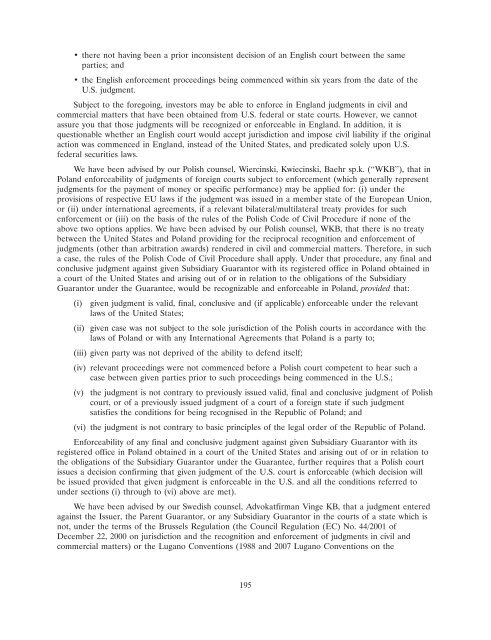Ardagh Glass Finance plc - Irish Stock Exchange
Ardagh Glass Finance plc - Irish Stock Exchange
Ardagh Glass Finance plc - Irish Stock Exchange
Create successful ePaper yourself
Turn your PDF publications into a flip-book with our unique Google optimized e-Paper software.
• there not having been a prior inconsistent decision of an English court between the same<br />
parties; and<br />
• the English enforcement proceedings being commenced within six years from the date of the<br />
U.S. judgment.<br />
Subject to the foregoing, investors may be able to enforce in England judgments in civil and<br />
commercial matters that have been obtained from U.S. federal or state courts. However, we cannot<br />
assure you that those judgments will be recognized or enforceable in England. In addition, it is<br />
questionable whether an English court would accept jurisdiction and impose civil liability if the original<br />
action was commenced in England, instead of the United States, and predicated solely upon U.S.<br />
federal securities laws.<br />
We have been advised by our Polish counsel, Wiercinski, Kwiecinski, Baehr sp.k. (‘‘WKB’’), that in<br />
Poland enforceability of judgments of foreign courts subject to enforcement (which generally represent<br />
judgments for the payment of money or specific performance) may be applied for: (i) under the<br />
provisions of respective EU laws if the judgment was issued in a member state of the European Union,<br />
or (ii) under international agreements, if a relevant bilateral/multilateral treaty provides for such<br />
enforcement or (iii) on the basis of the rules of the Polish Code of Civil Procedure if none of the<br />
above two options applies. We have been advised by our Polish counsel, WKB, that there is no treaty<br />
between the United States and Poland providing for the reciprocal recognition and enforcement of<br />
judgments (other than arbitration awards) rendered in civil and commercial matters. Therefore, in such<br />
a case, the rules of the Polish Code of Civil Procedure shall apply. Under that procedure, any final and<br />
conclusive judgment against given Subsidiary Guarantor with its registered office in Poland obtained in<br />
a court of the United States and arising out of or in relation to the obligations of the Subsidiary<br />
Guarantor under the Guarantee, would be recognizable and enforceable in Poland, provided that:<br />
(i) given judgment is valid, final, conclusive and (if applicable) enforceable under the relevant<br />
laws of the United States;<br />
(ii) given case was not subject to the sole jurisdiction of the Polish courts in accordance with the<br />
laws of Poland or with any International Agreements that Poland is a party to;<br />
(iii) given party was not deprived of the ability to defend itself;<br />
(iv) relevant proceedings were not commenced before a Polish court competent to hear such a<br />
case between given parties prior to such proceedings being commenced in the U.S.;<br />
(v) the judgment is not contrary to previously issued valid, final and conclusive judgment of Polish<br />
court, or of a previously issued judgment of a court of a foreign state if such judgment<br />
satisfies the conditions for being recognised in the Republic of Poland; and<br />
(vi) the judgment is not contrary to basic principles of the legal order of the Republic of Poland.<br />
Enforceability of any final and conclusive judgment against given Subsidiary Guarantor with its<br />
registered office in Poland obtained in a court of the United States and arising out of or in relation to<br />
the obligations of the Subsidiary Guarantor under the Guarantee, further requires that a Polish court<br />
issues a decision confirming that given judgment of the U.S. court is enforceable (which decision will<br />
be issued provided that given judgment is enforceable in the U.S. and all the conditions referred to<br />
under sections (i) through to (vi) above are met).<br />
We have been advised by our Swedish counsel, Advokatfirman Vinge KB, that a judgment entered<br />
against the Issuer, the Parent Guarantor, or any Subsidiary Guarantor in the courts of a state which is<br />
not, under the terms of the Brussels Regulation (the Council Regulation (EC) No. 44/2001 of<br />
December 22, 2000 on jurisdiction and the recognition and enforcement of judgments in civil and<br />
commercial matters) or the Lugano Conventions (1988 and 2007 Lugano Conventions on the<br />
195
















